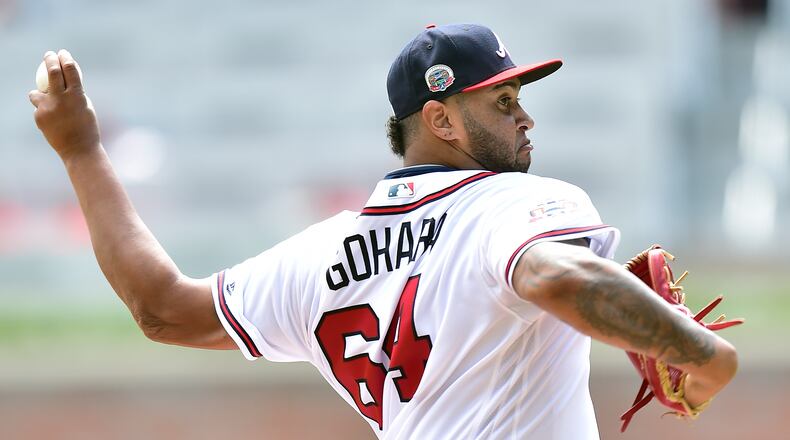Luiz Gohara has heard your C.C. Sabathia comparisons.
In fact, he endorses them.
The Braves’ big 21-year-old left-handed pitcher could be the ace-caliber prospect the organization has sought. His build and delivery resembles that of Sabathia, a Cy Young winner who Gohara has always admired.
“I don’t have any problem with that,” Gohara said. “I think it’s fun. We look the same. I’ve been following him since I was a kid so I try to take his delivery. And I think it’s working pretty good.”
Braves manager Brian Snitker remembers the prospect-edition of Sabathia, recalling him being “a lot bigger” than Gohara. The Braves’ prospect is listed at 210 pounds, which, to anyone who’s encountered him, is fair to call an undersell.
For such a physically intimidating presence, Gohara the person is anything but daunting. He’s soft-spoken, honest and easily approachable. Just the fifth Brazilian big-leaguer, he’s appreciative. He’s receptive to criticisms – his maturity and conditioning have been among them – and isn’t afraid to ask veterans questions as simple as times to report for games.
His first major-league start wasn’t pretty. Gohara lasted four innings, gave up six runs and walked four. He admitted nerves got the best of him.
“I just got a little excited for my first day in the big leagues, all that kind of stuff, and tried to calm down a little bit,” he said after the game, a 12-8 loss to Texas. “The walks just happen in baseball, we can (pitch with better) control but if you’re excited it’s hard to do.
“All my teammates came to me and were like, ‘Just relax, I know you’re a little tighter.’ The guys were (encouraging) me, trying to help me relax in the dugout and not get too excited to go out there and pitch.”
Snitker didn’t immediately commit to Gohara starting in another five days. But after brief consideration, Gohara is staying in a six-man rotation. His second start will come against the National League East champion Nationals on Wednesday in Washington.
“The last couple days have been feeling good,” Gohara said. “I’ve actually got more in my mind for what I’m going to do the next start. Couple mistakes I made in the first one, I’m going to work with the pitching coach and catcher, go over all of those innings I threw the last time.”
Gohara has continually preached the same area of improvement: controlling the zone. His fastball sits in the mid-to-high 90s, but the command can be inconsistent. He wants to turn his changeup into a better weapon. He tried using it in his first start, but “didn’t have the feeling for it.”
“Sometimes it gets away from him and they’re not experienced enough to reach back and fall back on anything to try and right the ship,” Snitker said. “I look at line scores and read reports from the minor leagues and it happened to him there, too. But you’ve got to like the stuff. I like the competitiveness. You can tell the kid’s not scared and he’s got stuff to get major league hitters out. It’s just a matter of refining it and the command.”
Gohara doesn’t consider himself a strikeout pitcher, even with 147 strikeouts across 123-2/3 minor league innings. He wants to be known simply as a pitcher who’s always ahead in the count. That didn’t happen in outing No. 1, but it isn’t an easy transition. After all, few arms are facing major leaguers at his age.
Starting the year with the Single-A Florida Fire Frogs, Gohara shot through the system, collecting a 2.62 ERA across three levels. He’s the first of what could be several ripely aged Braves rookie pitchers, with Mike Soroka and Kolby Allard, both 20, rapidly ascending.
“Really good arm,” G-Braves infielder Sean Kazmar Jr. said of Gohara. “It seems like there are younger guys coming up every week and they’ve been impressive. For everyone to come up from Double-A, High-A … It’s fun to watch.”
Yes, Gohara’s eligibility for the Rule 5 draft helped his case, but he feels he’s earned the opportunity regardless. After his first Triple-A start, he realized pitching in the majors soon could be reality.
“Last week I stopped literally and I’m like ‘hold on a second, yeah I’m moving pretty quick,’” Gohara said after his second start with Gwinnett. “And I keep working hard for progress and I hope I finish in the big leagues with all the work I’ve been doing. I’m going to keep working hard for that.”
Five days into his major-league career, Gohara looked back on his season and felt validated.
“I’ve worked for it, so I’m not really surprised at the movements they did to me,” he said. “I worked really hard for this to happen. I think I got here quick, but all of the work I did to show them I can pitch in major leagues.”
The Braves have a surplus of young starters, so much that rookie Lucas Sims was forced to the bullpen even with the expanded rotation. With Gohara, Sean Newcomb and Max Fried, the Braves boast three rookie lefties. But it’s competition amongst friends, Gohara said. He intends to use September as a stepping stone to a permanent rotation spot in 2018.
“I’m ready to just show I can make the starting rotation with the other guys,” Gohara said. “That’s my goal for next year. To break with the team in spring training and make the rotation.”
About the Author
Keep Reading
The Latest
Featured



